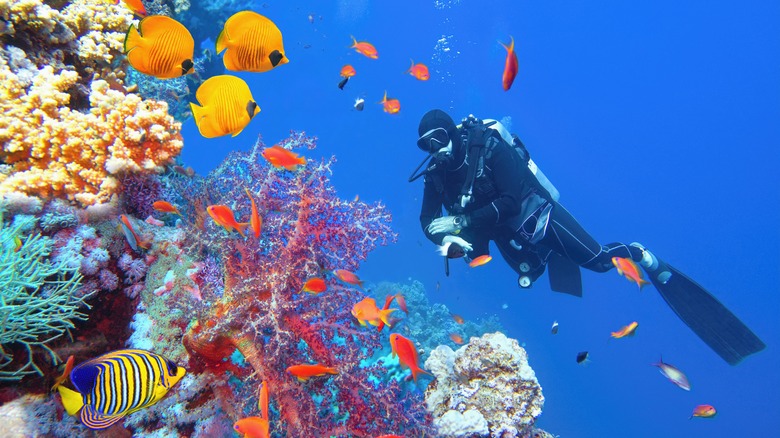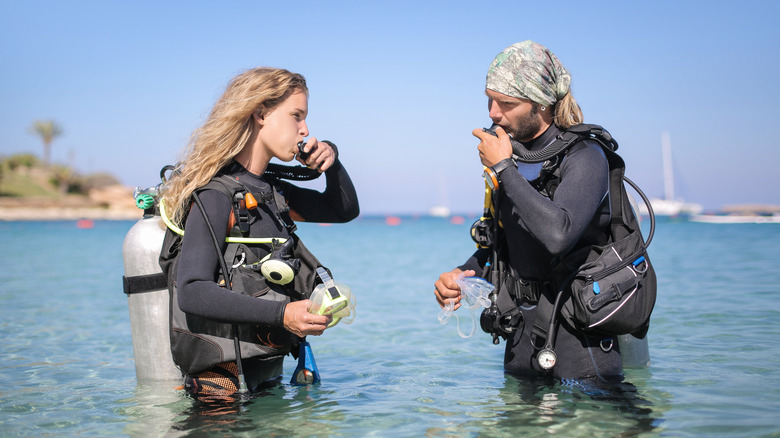Why You Should Avoid Flying Right After Scuba Diving
Why limit your travels to firma terra when there's a whole world of beauty just beneath the surface? If completing your dive certification on a tropical getaway is high on your bucket list, the preparation starts well before you put on your scuba gear. You'll want to carefully plan your departure date around your diving excursions, as your body will need time to adjust before you can safely travel home.
When you go beneath the surface of the sea, a few interesting things happen in your body at the same time. Your blood moves away from your extremities and towards your heart, increasing your blood pressure and lowering your heart rate. Also, nitrogen from your oxygen tank gets compressed inside your skin, blood, and organs. This is all fine and well during your dive, as it's a natural response to being underwater, known as the mammalian dive reflex.
When you come back up to the surface, though, the nitrogen in your tissues will need time to release safely in little bubbles. Think of a soda bottle that's been shaken up and accumulated pressure — a slow release is best. If you fly too soon after diving, the nitrogen bubbles could release too quickly into your bloodstream and constrict the flow of oxygen, resulting in symptoms of decompression sickness (DCS).
When it's safe to fly again
The more hours you can wait to fly after you go scuba diving, the better. The Federal Aviation Administration (FAA) says that passengers should avoid flying up to 8,000 feet for at least 12 hours after diving. If your flight goes over 8,000 feet — which is highly likely, considering most commercial airlines cruise around 36,000 feet — it's best to wait at least 24 hours.
These recommendations are based on trials carried out by the Divers Alert Network (DAN), which adds a little more context and nuance to the conversation. Out of 802 trials, researchers spotted 40 incidents of DCS in people that did repetitive dives and flew shortly after (or, rather, sat in a flight simulator with pressure changes). In single dives down to 60 feet and back, there were no incidents of DCS.
Your risk of "the bends" — the layman's term for DCS — depends on many factors, like your overall health, how many dives you took, how long each dive was, and how deep under the surface you traveled. If you do a single dive, DAN suggests you wait 12 hours to fly. For multiple dives, give it about 18 hours. After a "deco" dive that requires decompression time underwater before you come up back to the surface, hold off on flying for 24 hours or more.
Symptoms of DCS to watch for
The good news is, the chances of you getting DCS are rare. There are only three cases for every 10,000 dives done recreationally (it's slightly higher for commercial divers). Males are more than twice as likely to get it than females, and 75% of symptoms present within the first hour or so. The symptoms occur on a spectrum, ranging from type I to type III, and all require medical treatment with oxygen or, in more serious cases, a hyperbaric chamber.
With type I symptoms, you might notice joint pain and skin changes, like rashes or motting. For type II, you would feel numbness or tingling sensations, an inability to coordinate your movements, trouble with cognition, difficult breathing or chest pain, ear ringing (tinnitus), or difficulty controlling your bladder or bowels. In the most severe cases, it can cause permanent brain or spinal damage and, in some cases, be fatal.
The goal is not to scare you off scuba diving, of course, but just to make sure you're aware of what signs to look out for in yourself and others. Pay attention to your body, and don't be afraid to ask for help from the dive center if you need it. In some popular diving spots, like Hawaii's Big Island, it's possible to climb 2,000 feet in elevation just from driving around on the road. Be mindful about all elevation changes, be it land or air. Instead, take it easy for a day or so. Hey, at least you have a solid excuse to extend your vacation, right?


